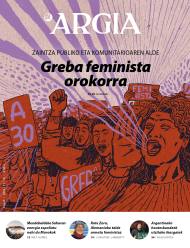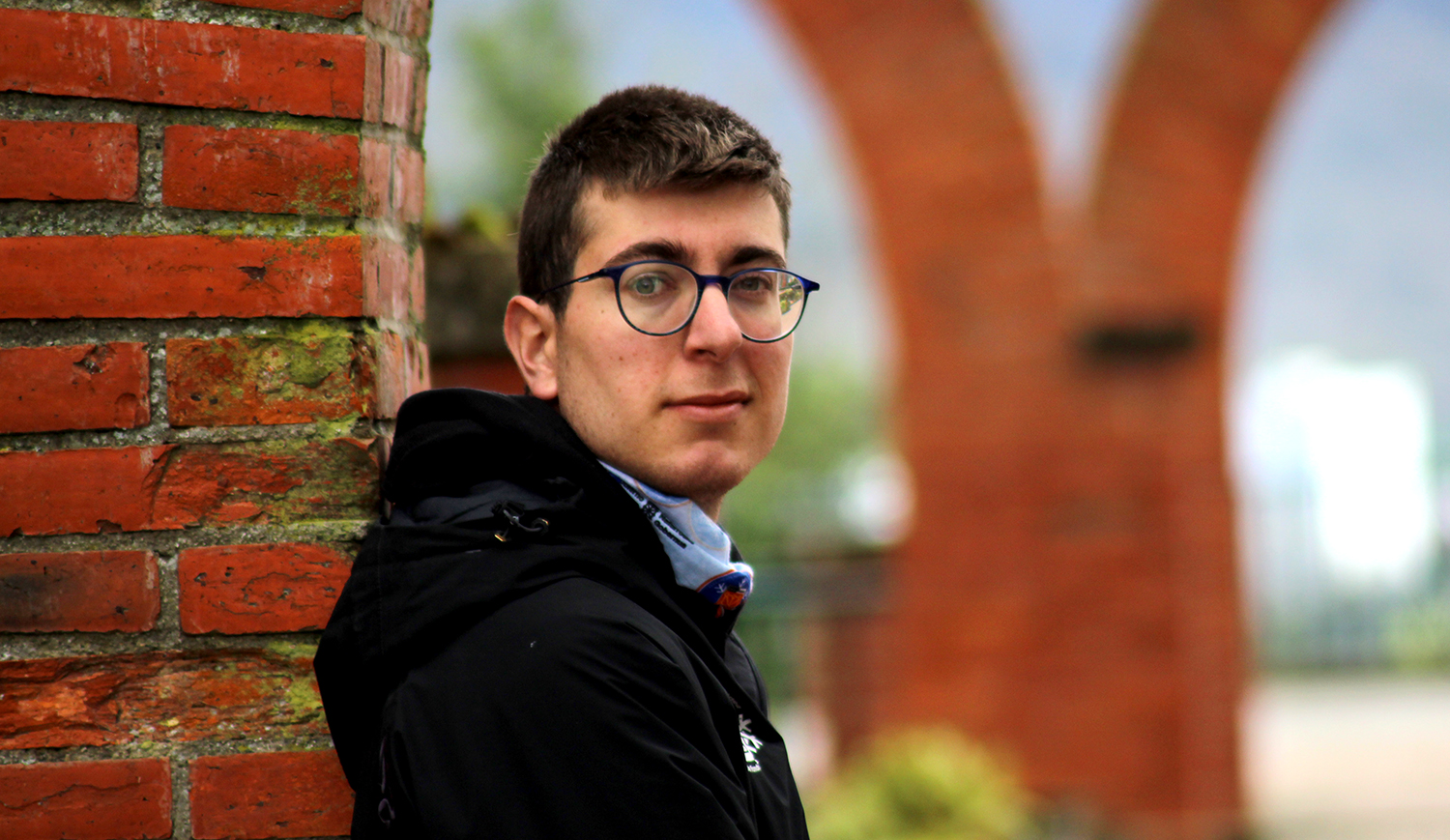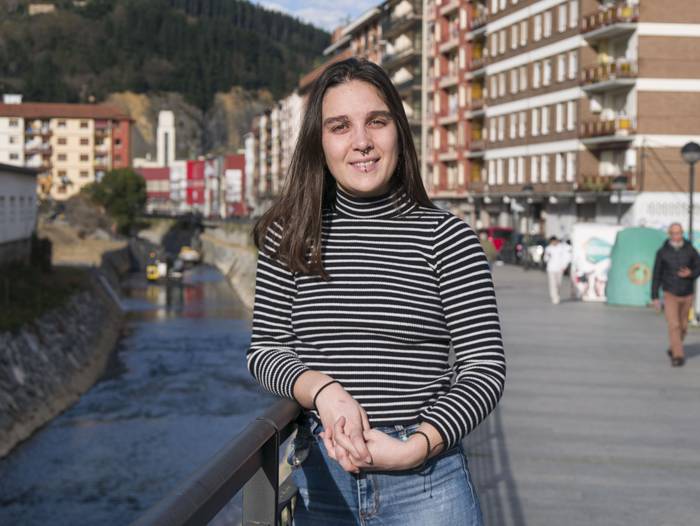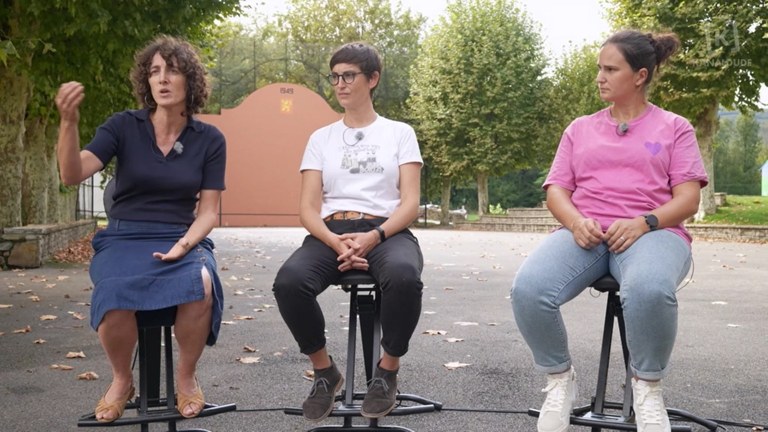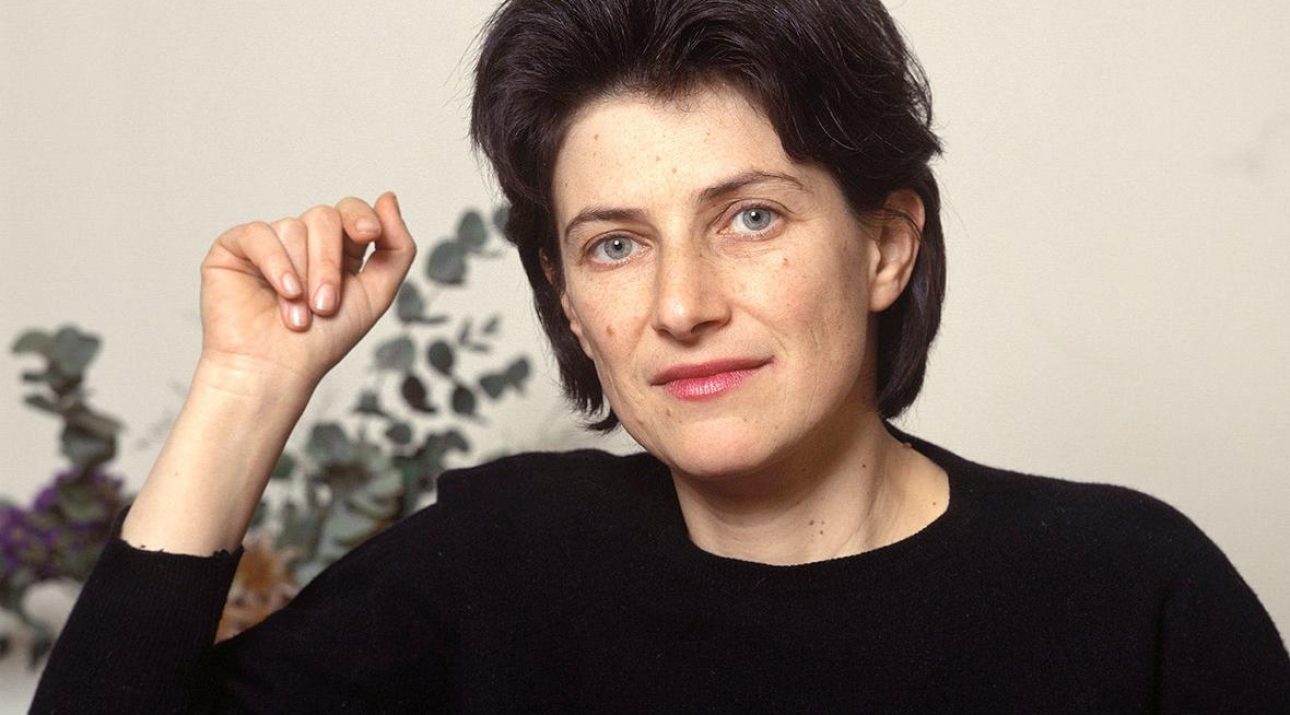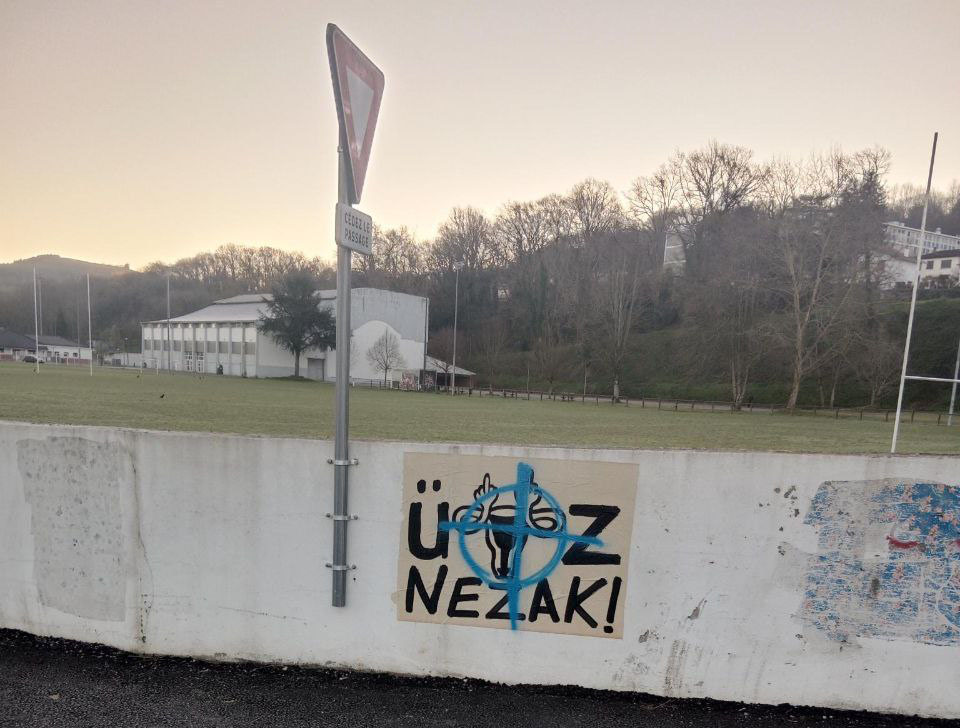"Now everyone wants to be a feminist, but violence against women does not stop"
- Last October, activist Christine Lamberty visited various places in Euskal Herria, invited by the Baskale association, to present the documentary Frenen Bildet Banden (Women, Osatu groups). The film tells the story of the urban guerrillas of Rote Zora, but also the story of the struggles that during the 1970s had been boiling. Lamberty describes his mood: “We thought the system could change radically.”

Christine Lamberty. Rhine-Palatinate, 1946
In the 1970s, feminist activism began, then called the Lesbian Women's Movement, and it continues on. It has also fought against anti-militarism, the fight against digital control ... LasOtros, a member of the film community, has made films about different social movements. Available on the network on the group website www.lasotras.de
Firstly, I would ask you to come forward.
I'm Christine and -- it's hard to explain where I am from. I now live in the surroundings of Berlin, in a project of coexistence. And I've been involved for a long time in a film community called LasOther. In this regard, I have to say that we are not frontline filmmakers, we are activists. I've been a feminist activist since the early 1970s. To a large extent, we make films to encourage movement.
Yes, just the next thing I wanted to ask you about the LasOther group. How does it emerge? What movies have you made so far? For what purpose?
We created the group around 1996. At that time the struggle of the sans papiers broke out in France. We knew that the spokesman for the movement studied in Germany, and therefore worked in German. You couldn't come to Germany because you didn't have paper, but we thought it was important to bring those of that movement to us. We created a team and went to it, and we made our first film. It's called Wir sind schon (We're already here) and you can see and download it on our website. And then we continue to go to manifestations and acts, to record. But on the other hand, we've always been asked for things. “Can you make one film of this or another?” And we hacemos.Has came to Euskal Herria to present a documentary about the
Rote Zora group. How does the idea of making that film come about? As I said, for a long time I was active in the Lesbian Women’s movement in the Federal Republic of Germany, and it was important for me to continue to convey that knowledge
after the movement was reduced. In the first speeches on this movement, there was talk mainly of projects, but there was no talk of the radical movement of lesbian women, which existed at that time, although it was the starting point for all subsequent projects. In the end, the opportunity was taken to make a film about the Rote Zora group, but not only about that group, but also about the relationship with a broader movement.
What was the relationship between Rote Zora and the Lesbian Women movement?
At least in my experience, there was a very close political relationship. These were important issues, both for abortion, violence against women, war, genetics and reproduction techniques... Some organized demonstrations around them and others attacked and wrote texts.
For us the texts of Rote Zora were very important, because they were the result of in-depth research and represented clear political positions. We read and discussed the texts. And that gave us strength.
.jpg)
What were the demands of the Lesbian Women movement at that time?
We did not make demands, that is, we did not ask the state. We did not trust it, but we fought for our rights: to have the opportunity to abort, to have rights over our bodies, to own ourselves, and also to combat violence against women, and in this connection in solidarity with the fight against colonialism, for internationalism, to improve the working conditions of women from other countries, etc. But we didn't demand anything, we did, we fought for our rights.
Upon arriving at the film you have collected the testimonies of some of the protagonists of the time. We hear the voice of Rote Zora's members, but we don't see their faces.
We initially wanted to interview the members of Rote Zora. We prepared the questions and sent them saying we wanted to make a movie with them. They sent us a long answer, which was happy to answer our questions, but they didn't want them to appear on the video and they didn't want us to see them either.
Why not? On the one hand, we were told that their struggle was always collective, that today they couldn't all speak at once, and they didn't want the struggle to
be individualized, that is, only one spoke on behalf of the group. On the other hand, the members of the group are not known, we do not know who they are and, if they said so today, they feared that this would entail consequences for themselves or others. For example, the police could use the networks or contacts they had to rebuild. And another said he didn't want to appear, because maybe at some point he would want to go back to militancy.
"In Germany, it seems to me that the feminist movement is very fragmented… Unfortunately, there is no unitary force"
How did Rote Zora emerge? For what purpose? The
first attack was on the Federal Medical Chamber, which sought to maintain at all costs paragraph 218 of the abortion bill. And the struggle to change this paragraph was one of the starting points of the women and lesbian movement. It was in 1977. That year the night of Walpurgis was first organized under the motto: Women recover the night. We learned it, if we left the street after eight o'clock at night and without the help of men, if we were told our fault was ours. We were wrong to deal with this ban and to go down the street together. And Rote Zora attacked the Medical Chamber that night, on the one hand, to contribute to the demonstration and, on the other hand, to express their opinion in line with the Abortion Law.
Two other outstanding campaigns were subsequently carried out, one in the field of genetic research.
Yes. The field of gene technology shows the patriarchal obsession with the existing viability, that is, how patriarchal power wants to appropriate, disassemble, use and reassemble it according to its needs. This is very evident in genetic engineering. And Rote Zora was basically against that patriarchal policy.
It also has a direct bearing on the history of Germany, right?
Of course. This study of human genetics is also related to eugenics, who should live, who should not, who takes place here and who does not. Rote Zora entered a center in Münster [Human Genetics Advisory Center] and found archives, documentation from the Nazi era. It became clear, therefore, that there was a relationship with this time, at least in thought, even if it was ideologically thereafter. There was a lot of movement around this issue. And the members of Rote Zora conclude in the film that in Germany, compared to other countries, the line of genetic engineering has developed more slowly because of ongoing attacks and criticism against it. I too agree with that.
Another notable campaign by Rote Zora against Adler.
Adler is a German textile company. Their workshops in South Korea faced major conflicts, workers’ protests and brutal repression. Her women asked for help from Germany and several campaigns were carried out, including from the church. Subsequently, Rote Zora suffered a series of attacks and finally the head of the company agreed to meet the requirements of Korean workers. It was a great international victory.
"Feminism is fashionable. Also companies that do business exploiting women from other countries draw clothes where they claim the power of women, feminism, etc."
The time was also like this, right? Like Rote Zora, there were more action groups inside and outside Germany. It was a time, in
general, highly politicized, with strong confrontations on the street. We had the hope that we could demolish the system. Everybody was talking about revolution, certainly not knowing what exactly the revolution was, but we had the feeling that the system could change radically, I think it was an important point. And there were strong mixed groups, including armed groups: RAF, June 2… As well as the Revolutionary Cells, RZ in German. Rote Zora was also part of it. Feelings were on the street, and that environment prevailed a lot at that time.
Then it changed.
Totally. For various reasons. On the one hand, the enormous repression exercised against movements, on the other hand, the capacity of the system to integrate resistance within it and, finally, the arrival of neoliberalism, with totally different conditions, which led to the failure of many movements, even at international level. And I think that expectation of radical change in the system disappeared.
Could one of the goals of a film about Rote Zora be to learn from the struggles of the time, hoping that today we can contribute?
I think so. It's not about saying "look at what fantastic things were done in the past," but about learning about the hour. We always say that history is an important reference for learning from mistakes, but perhaps it can also serve to gain strength. And in many presentations I found that today people are looking for what they can do. It is clear that we cannot go on like this; something must be changed in its roots. And we know about it. There were a number of struggles that contributed to the success of the movement and could give back strength.
What reception has the film had in Germany and internationally?
Great, we're surprised. We've all been told it gives them strength and courage. We did not think that it would return to so many languages, we have not pushed it forward, we have proposed it from the outside, as in this case. On the other hand, I believe it is important that the texts of Rote Zora have also been translated into other countries. There is interest in the group, but not only in the group, but in its ideas. How do you cross the boundaries? How do you fight with everything you have at your disposal for your rights and for the lives of people?
.jpg)
In Euskal Herria you have made several presentations. How did they go? It was
very interesting. In Otxandio, for example, two young women came and asked us, among other things, what kind of protection Rote Zora had from society, that is, whether they had done the first action and received the support behind it, or whether the support and actions had gone together. I think behind this question was a thought like this. “Perhaps now there is no explicit recognition of such actions, but if we did, would people perhaps support us?”
What is the current situation of the feminist movement in Germany?
Good question. Feminism is fashionable. Businesses that do business exploiting women from other countries also take clothing where women’s power, feminism, etc. is claimed. The German Foreign Minister is a feminist and everyone wants to be a feminist. However, violence against women and femicides continues. I think the feminist movement is very fragmented. There are many activists in the environmental movement, in the anti-fascist, in the anti-racist, in the line of care... but unfortunately there is no unitary force.
Returning to what you said about the mood of the 1970s, do we not believe today that we can derail the system?
Either we knocked it down or we knocked it down. We must not forget to what extent the environment has been damaged. It won't continue that way another day, or what's happening now with digitization and this new access to life. They want to reabsorb all that is a living being. With this transhumanism, or with this human machine system, we cannot move without a trace of that movement. I think we have very little awareness of how much they can control our resistance. Things are constantly changing in that sense. We used to be in touch internationally, without the Internet or telephone, but we still met and discussed things. That has been forgotten. How can we revive? It is urgent.
* * * * * * *
BRIEF HISTORY OF THE DEBTOR
Rote Zora was an urban guerrilla of autonomous feminist women trained in the Federal Republic of Germany. In total, forty-five were attacks on infrastructure by security forces, companies, courts and factories. They put explosives on patriarchy, imperialism and militarism, and they had never injured anyone. It was created within the autonomous Marxist armed organization Revolutionäre Zellen (Revolutionary Cells) of the 1970s. From 1986 onwards, he continued his journey alone. To learn more: Rote Zora. Feminist urban guerrilla in the heart of the beast, 1974-1995 (Katakrak, 2023; translator: David Lindemann).
Gozamen aparta bezain deskribatzeko zaila dakar, norbaiten hitzak irakurri edo entzun ostean, zera pentsatzeak: “Horixe zen neu aurreko hartan azaltzen saiatu nintzena!”. Idazlea eta itzultzailea da María Reimóndez, eta galegoz aritzen da, hizkuntza... [+]
Orain arte desgaituak ez diren pertsonekin lehiatu da Uharteko Ipar Eski Taldeko Eneko Leyun eskiatzailea (Iruñea, 1998). 2024-2025 denboraldian, lehenengo aldiz parte hartu du Adimen Urritasuna duten Pertsonentzako Iraupeneko Eskiko Espainiako Txapelketan. Urrezko... [+]
Joan den urte hondarrean atera da L'affaire Ange Soleil, le dépeceur d'Aubervilliers (Ange Soleil afera, Aubervilliers-ko puskatzailea) eleberria, Christelle Lozère-k idatzia. Lozère da artearen historiako irakasle bakarra Antilletako... [+]
Endometriosiaren Nazioarteko Eguna izan zen, martxoak 14a. AINTZANE CUADRA MARIGORTAri (Amurrio, 1995) gaixotasun hori diagnostikatu zioten urtarrilean, lehen sintomak duela lau urte nabaritzen hasi zen arren. Gaitz horri ikusgarritasuna ematearen beharraz mintzatu da.
Duela aste batzuk, gurean egon ziren El Salvadorko eta Kanarietako emakumeen eskubideen aldeko hainbat aktibista. Sexu- eta ugalketa-eskubideez eta eskubide horiek urratzeak emakumeengan dituen ondorioez aritu gara; hala nola El Salvadorren berezko abortuak izanda homizidio... [+]
Zuberoako ohiturei buruzko bi liburu ditut gogoan. Batek XX. mendean aritu izan diren 180 dantzari eta soinulari aipatzen ditu. Haien artean, emakumezkorik ez da agertzen. Besteak, pastoralei egiten die errepasoa eta hor emakumeak aipatu aipatzen dira, baina omisio esanguratsuak... [+]
1984an ‘Bizitza Nola Badoan’ lehen poema liburua (Maiatz) argitaratu zuenetik hainbat poema-liburu, narrazio eta eleberri argitaratu ditu Itxaro Borda idazleak. 2024an argitaratu zuen azken lana, ‘Itzalen tektonika’ (SUSA), eta egunero zutabea idazten du... [+]
Antifaxismoari buruz idatzi nahiko nuke, hori baita aurten mugimendu feministaren gaia. Alabaina, eskratxea egin diote Martxoaren 8ko bezperan euskal kazetari antifaxista eta profeminista bati.
Gizonak bere lehenengo liburua aurkeztu du Madrilen bi kazetari ospetsuk... [+]
Pertsona lodiek lodiak izateagatik bizi izan duten eta bizi duten indarkeriaren inguruan teorizatzeko espazio bat sortzea du helburu ‘Nadie hablará de nosotras’ podcastak. Cristina de Tena (Madril, 1990) eta Lara Gil (Fuenlabrada, Espainia, 1988) aktibista... [+]
Donostiako Tabakaleran, beste urte batez, hitza eta irudia elkar nahasi eta lotu dituzte Zinea eta literatura jardunaldietan. Aurten, Chantal Akerman zinegile belgikarraren obra izan dute aztergai; haren film bana hautatu eta aztertu dute Itxaro Bordak, Karmele Jaiok eta Danele... [+]
Martxoak 8an egindako pintaketak gainetik margotu dituzte ikur faxistekin Zuberoako hiriburuan. Horren aurrean elkarretaratzera deitu dute, astelehenean.









